Charlie Says: Interview with director Mary Harron and writer Guinevere Turner
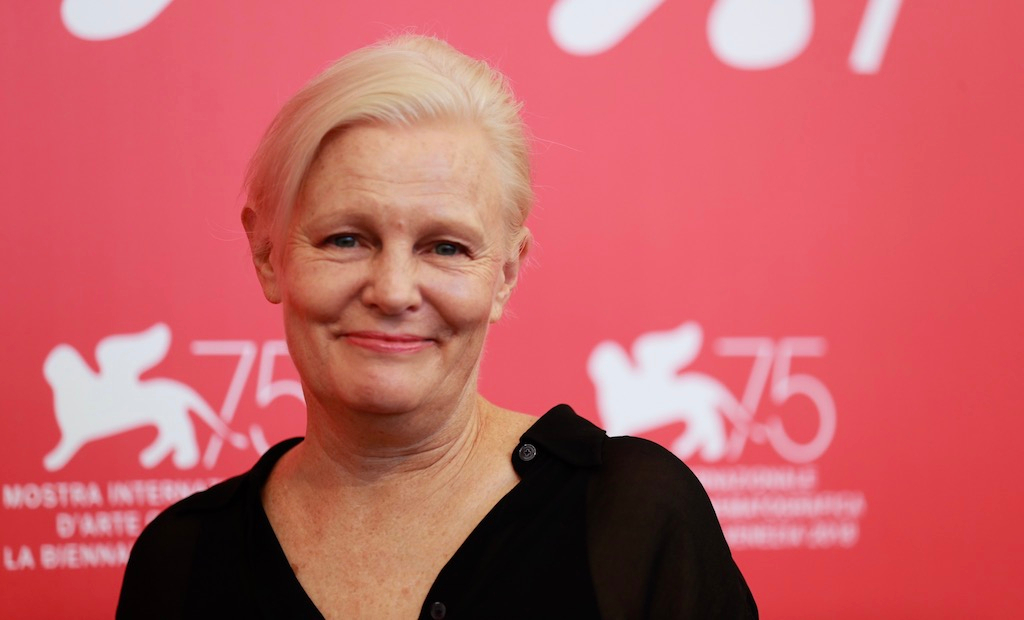
Nearly two decades ago, director Mary Harron and writer Guinevere Turner were the core creative force behind dark comedy horror American Psycho. Their latest true crime collaboration, Charlie Says, takes a bleaker approach, rewriting the notorious story behind cult-leader and serial killer Charles Manson (Matt Smith) by focusing on the imprisonment of his female followers and the account of Karlene Faith (Merritt Wever), the graduate student sent in to teach them.
We spoke to Harron and Turner about their evolving relationship and the importance of the female perspective.
Why did you decide to make this film?
Guinevere Turner: I was hired to write a film about the Manson girls. I can’t stand these two words together considering they are women in their 60s who have been in prison for 45 years. I did a lot of research and try to find a new way to tell the story and eventually, I came across Karlene Faith and her time teaching them in prison and I thought: this is a great story, this reimagining of a well-trodden territory from a woman’s perspective.
Mary Harron: I was reading it as a friend as I was really intrigued when she said she was going to include the perspective of the women in prison three years after the murders and what happened to them because no one has covered that. I said if the director whose attached doesn’t do it I would be interested.
GT: Then I believe one of the things he said was: I didn’t sign up to write a women-in-prison movie.
MH: And I said I’ll make it, I love the women-in-prison stuff, and I find Karlene a really wonderful character.
GT: Beautifully portrayed by Merritt Weaver
What brought you to Matt Smith?
MH: I love British actors. The last couple of things I’ve done I went over to London, I have family in London, so I always check who is available and who is around. I was already going over because Hannah Murray auditioned for me on Skype. When the right person comes in you really can’t get them out of your head and I couldn’t think of anyone else for that role. I thought I should just go and meet her, and while I was there I heard Matt Smith was interested in meeting on the film and he came in and when he auditioned, that was it, there was no one else.
He and Hannah had worked together a number of times already?
MH: Yes they did. They’d been in a play and a movie together. So that was fortuitous. It’s just an accident that the two very American characters in this story happen to be British.
GT: And Marianne Rendon had just played Patti Smith in Mapplethorpe.
MH: It was all by chance.
There are a lot of different stories to tell. Was it difficult to find the right balance among all these characters?
GT: It started in 2014, so it took a lot of time. There’s a lot that I wrote that isn’t in the movie; I had to focus focus focus, as there were so many fascinating stories. Actually finding the book about the prison really helped me focus because it’s really these three women’s stories and then really thinking about Leslie and the sympatheticness of that character, it seemed obvious that doing it from her perspective was important. Everything else falls back when you realise whose story you are telling.
Did Manson’s death have any effect on the making of the film?
MH: He died right before we started filming. It was a little liberating knowing he wasn’t there but in some ways, because he’s been in prison for 40 years it was as if he was dead already.
It’s different with Leslie Van Houten; there’s a movement to get her paroled. What’s your opinion?
GT: I think it’s the reason that one of the characters says in the film: Would you feel like that if it was your sister she had stabbed? Because I would feel like, 100%, they have done their time, let them have a life, they are in their 60s and they’ve been treated so much more harshly than women who have done similar crimes from different backgrounds.
MH: Also she didn’t stab Sharon Tate.
GT: Yeah she didn’t stab the famous one. If it was up to me right now I’d say yes. But if it was my sister, I’m not sure what I’d say. I’m not sure if you can really put yourself in those shoes.
Is the famous nature of the crimes why she is still there?
MH: John Waters always says that they’ve served longer than anybody at the Nuremberg trials and I think there’s definitely a case where the people at Nuremberg could say “we were brainwashed; we were following orders”. It’s a parallel in a way. But on the other hand, this is not a work of advocacy. We didn’t make this film to get Leslie out of prison. You don’t want to take sides. In pre-production, we said: I think we need to show the LaBianca murders in detail.
GT: Initially In my script, it was flashes of it, but I chickened out on facing those murders because the true crime element wasn’t at all what I’m interested in. Then Mary said: you can’t shy away from the murders because it feels irresponsible. And no one’s going to pay attention if they think its a work of advocacy.
MH: Then it seems like: these are nice girls in prison. Yes, they are nice girls in prison and the whole difficulty of this is ordinary people doing terrible things because they’ve joined a group mind and they’ve got themselves into a situation where they are brainwashed. This happens in civil wars. People kill their neighbours because they are under the influence of brainwashing or some group mind. It’s always difficult to face up to the fact that likeable people, your sister, joining a cult and doing something terrible. For everybody looking at the movie, you don’t want just to stereotype them as monsters and something other to us. I wanted to look at them and see my common humanity with them. But at the same time, I wanted the audience to both have sympathy and face the reality. This is what happened. They were in this dreamlike state and then suddenly they’re in this house and these people are dying.
GT: An interesting thing about the LaBiancas is that they weren’t famous, they were just regular people so people aren’t so aware of what happened to them and this hideous clumsiness and awkwardness to the way that they were killed. This absent senselessness. And with pillowcases and lamp cords? This is all true and very weird. And out of response to the people’s families, you can’t shy away from it.
Tarantino is also doing a film that has this story in the backdrop.
GT: I like to say if you put a rock in the middle of the table and put Quentin there and me here, and said write about that rock, they’d be very different movies. But also I don’t think he’s nearly as focused on Manson as we are
MH: I love his movies and I’m excited to see his. I think it’s about Hollywood from what I gather. When you hear that someone else is doing the same subject you think, oh damn. But part of us is thinking: well we can do ours first, so…
GT: And then get a lot of press when his comes out.
MH: Because we couldn’t do ours after. I said to the producers: we’ve got to do this now. It seemed this was the time we were ready I had made everyone wait for a year while I did Alias Grace so I already felt we had delayed it a lot.
Was there one particular aspect that you wanted Matt to focus on in his portrayal of Manson?
MH: I said to him in our early conversations that because Manson grew up in prison since he was 12, he was like an animal who had grown up with a lot of fear and abuse and learnt how to survive in a dangerous, hostile environment. He was almost entirely instinctive and not rational. A lot of what he says is nonsense, really. But he was very good at sensing weakness and danger in others. He was a predator but also on the defensive. Think of yourself as an animal: I think that was the main thing. And then also to define what was vulnerable and pathetic in him as well.
Was Manson a malignant narcissist?
MH: That’s probably a good description. He was very very low on empathy. He didn’t care at all about these girls. That was shocking to me: these girls that sacrificed their lives to him, he never even bothered to contact them after they were sentenced. And Patricia was so madly in love with him, it’s tragic.
What’s the fascination of true crime for you, both personally and generally?
MH: They are all different crimes in different movies. In this particular one, she was such a special character. I was interested in her as an outlier and where she fit into the whole world. With this one, I was just interested in ordinary people doing terrible things. And I think the fascination of true crime is always: could it happen to me? It’s close to home always. This really happened.
Matt Smith was also on stage in American Psycho?
MH: That’s where I met him!
Are you concerned that this film, from afar, might get compared to American Psycho?
MH: I would really hope they didn’t do that. But I can’t stop them.
Do you see any thematic connections between the films?
GT: They’re so different.
MH: Very different stylistically. Obviously, this one’s a novel and that one’s very surreal and a comedy and there aren’t a lot of laughs in this one. What Chris and Matt did was to find the pathetic quality, the loser in them. Batemans pathetic as well as homicidal And Charles Manson was basically a pathetic loser of a man who happened to find some power.
GT: It’s crazy to me because the number of men who said to me: “you wrote American psycho? Wow. I am Patrick Bateman”. First of all Patrick Bateman is a serial killer and secondly, he’s a loser. You really didn’t get the movie. And Charlie also had all this serial killer notoriety surrounding him and it’s kind of satisfying to say that he’s kind of just a conman pimp who got lucky with the time period.
And it’s all in his head, right?
GT: We won’t go there!
MH: We didn’t want it to seem that way but obviously we didn’t succeed.
Did you consider talking about the backstories of the girls and how they were abandoned by their families?
MH: They each had such different journeys. Leslie had some upsetting traumatic things but she came from a middle-class family devoted to her. Susan’s parents were alcoholics, Pat had a family that stayed together but was not happy, Tex came from a stable, small-town family. Nothing in their backgrounds is something that you can peg. They all came from different places but it’s not a reason.
GT: I’m always hesitant to say that this person is this way as an adult because of something that happened to them as a child because many people who’ve had traumatic childhood of varying degrees turn out ok as adults and some of them are serial killers, therefore its not that predictable and not that interesting to me storywise. It’s too easy to say people do things because of these things and that’s a sade logic.
MH: If you look more at crimes happened in war, when platoons end up doing horrible things because they’re part of a group, like terrorists who decide to blow up innocent people, which also happened in the 60s (and now), personal psychology isn’t enough to say how you got there. It’s more the power of how someone gives up their individual will and responsibility, and there are people from all kinds of backgrounds who do that.
How much did you both listen to The White Album?
MH: Not much.
GT: Neither of your daughters knew it and we did get to play it to them.
MH: Oh yeah.
GT: They said: this is good.
Do you think this idea of following someone mindlessly could be applied to the Republican party now?
MH: It is very interesting to see how people give up their individual will. It’s not why we made the film and it’s bizarre, but the republican party operates a bit like a cult. We are in a very strange moment of history.
GT: And like Charlie, our president is usually talking nonsense, but for some reason people get into that nonsense and what he does, like Charlie, is create an Us and Them dichotomy, the idea that you belong to something and everything outside of it is a bad thing and disturbing.
MH: There’s this website online that gives the 20 qualities of a cult leader… and Trump has most of them, including the Us and Them, the complete narcissism about making everything about them, it’s astonishing, the lack of empathy, demanding loyalty.
Is it a bigger challenge for female filmmakers?
MH: Yeah.
GT: Yeah that’s just life as a woman. It’s just harder to get ahead.
M: But the great thing is there are so many stories to tell and I always found that exciting, and I remember my first movie, when I didn’t know if I could direct anything, I thought no one’s going to tell this story and I felt that I had something to say. I’ve got a new perspective and it gives me motivation.
How did you work on the cinematography and the colours between the ranch and the prison?
MH: We decided the ranch would be warm and handheld prison not. There would be no steady cam because there wasn’t in the 60s. We had to shoot quickly because it’s low budget. The DOP did a lot of things with the shooting, he flashing the film in a certain colour and we look at Badlands, a lot to try and get the scheme of those landscapes. And with the prison scene, my DOP was Swedish and I said I wanted it to be static portraits and classic lenses and he said yes, we can do a Bergman persona with big close-ups and cool colours. And then with the murder scene, during a meeting I said Kubrick, and we used the phrase “just information”. The murders are going to be flat, objective, unglamourised, unaestheticised. Quite hard lighting. Just the information of what happened, as clumsy as it was.
Was it hard to find someone to play Sharon Tate?
MH: I was so lucky that Grace Van Dien came in. So beautiful and lovely and sensitive, and she’s only 22. She’s actually young to play Sharon but we made her up.
GT: When I met her I was like: wow. She has this magical sweet quality.
MH: Like a fawn. Like Sharon. Like a woodland creature. So vulnerable and innocent. It’s a terribly sad story.
Do you think TV offers more freedom now?
MH: I do. I particularly love… episodic television is less a director’s, more a writer’s medium. I love doing mini-series, which I can shoot what is basically a long movie. I shot it as if it was a movie. I’d do that again. You just have to keep your eyes open if you are a writer or director, and look at who will give your creative freedom.
You two have worked together for a very long time now. Where did you meet and what keeps you coming back to work with each other?
GT: Groucho club. It sounds fancy but we aren’t fancy.
MH: We met with Christine Vachon, a famous producer.
GT: And I was there for a press thing and I was like… Go Fish.
MH: We just started talking got on really well when we got lunch.
GT: You asked who was Betty Page?
MH: I thought it was later on?
GT: Literally our first meeting.
MH: We had the same sense of humour, cynical qualities and I was already working on Betty Page but then American Psycho came along and I thought I would really like to collaborate with someone and I really liked Guinevere’s work. She had just done this groundbreaking lesbian comedy, and I’d done this film about an extreme radical feminist and it was like, no one can tell us what to do. To hell with us if you attack our take on this. It gave us a little more power.
Has this collaboration evolved since your first film?
MH: Yeah. But it’s always kind of the same.
GT: The success makes you adjust to the other person more. But it’s the same. It’s still really fun. We laugh a lot.
MH: You have to because you’re in a dark place so you make a lot of private jokes. The funny thing is that when you shoot a dark thing the set is more fun to keep it light. Shooting these things is hard, intense and rough. Luckily we had so little time on this one. The final scene we shot in one take.
GT: Part of us is excited that it’s mercifully over; for me, I get so upset and experience it in a very real way.
The look is very authentic. Did you make the actresses do that?
MH: Yeah, I said to them don’t shave anything, don’t pluck your eyebrows, don’t wash your hair, no makeup, let your clothes get dirty. They were on a ranch with hardly any running water.
GT: Sleeping on the floor.
MH: They’re young and beautiful so they looked great anyway.
Could this work as a miniseries?
MH: It would have been interesting because there’s a lot of material.
GT: I could keep talking about this story for a while. I know a lot and one of the hardest parts was keeping it focused because there are so many fascinating stories. I don’t know, structurally, what it would look like as a miniseries, it would have to be very different in terms of the prison stuff, but I can see it.
MH: There was a lot of stuff we couldn’t show. When you already have two timelines going back and forth… And even Merritt Wever said, I know you like Karlene, but this story’s about her relationship.
How did you work with her, because it’s such an important role but a small piece of the story?
MH: Merritt is such a great actress. She did a lot of research.
GT: We talked a lot about Karlene, but she was just so right for it. She had this intuitive embodiment of the character.
MH: A lot of directing actresses is just a little bit of directing, it’s really casting, getting the right person to play it.
But everyone auditioned for Leslie?
MH: Yes they all went for Leslie. Casting is so specific, especially on film. It’s very clear. And I’m not just talking about looks. There’s some emotional quality that comes through on camera that is just essential and means that person can do that role and that person can’t. And you can have great, talented people come in and they’re just not right. They have to be perfect.
Do you have another script project?
MH: We do
GT: I have to wait. Marys going off to do another movie.
MH: We’re still writing.
The songs sung by Matt Smith, were they improvised?
MH: He improvised all the time.
GT: She’s asking about the songs.
MH: Oh the songs… Three weeks before filming, I heard from someone: Matt doesn’t play the guitar. So he got a teacher and learned fast. He’s very musical.
But there was improvisation in general?
MH: Yes, some lines, some dialogue. Charlie is basically spouting talking nonsense so it’s not about what he’s saying but the rhythm and the tone.
GT: And once I got into that writing, Matt and I talked about that. Once you get into the style of that nonsense, its fun to just run with it.
Filippo L’Astorina
Photo: ASAC
Charlie Says does not have a UK release date yet.
Read more reviews from our Venice Film Festival 2018 coverage here.
For further information about the event visit the Venice Film Festival website here




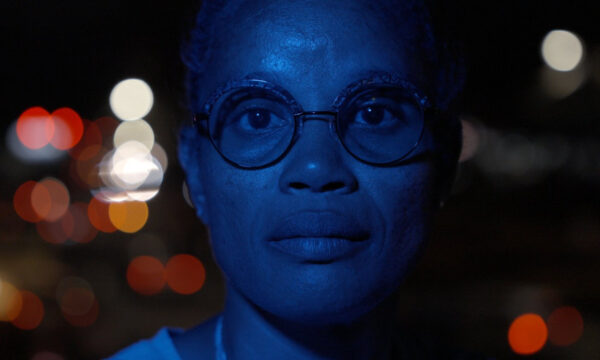
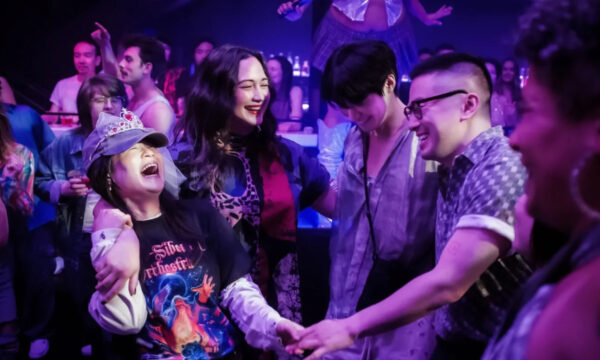
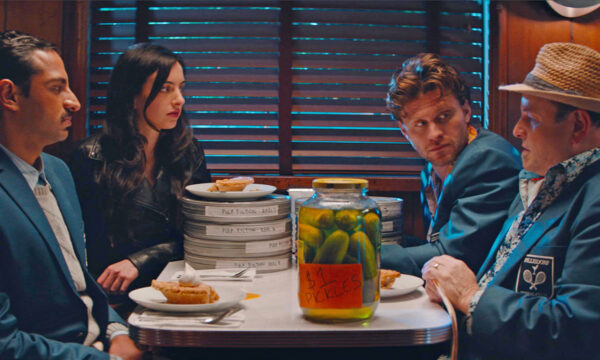
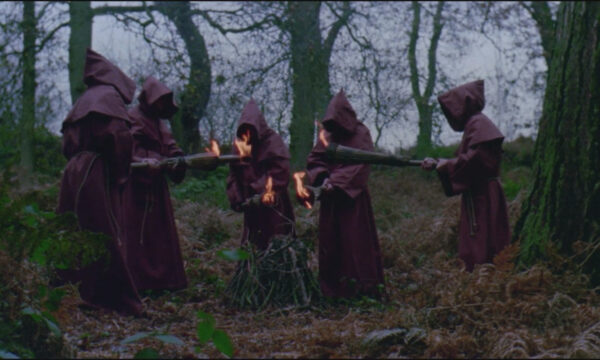
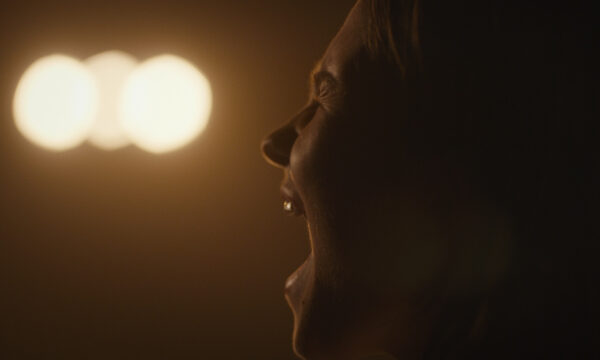
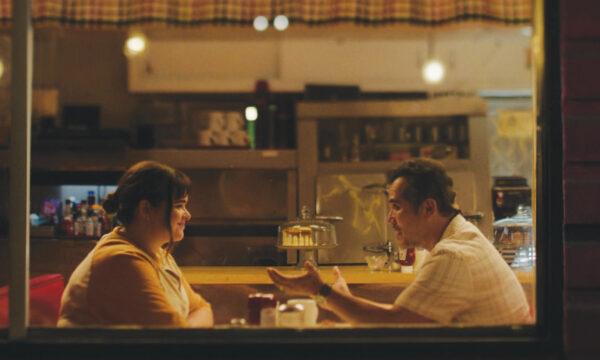










Facebook
Twitter
Instagram
YouTube
RSS